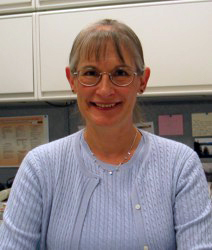 |
Karen Schumacher, Ph.D. |
Karen Schumacher, Ph.D., whose research strives to design interventions to help caregivers, will receive the Oncology Nursing Society’s Excellence in Writing Award for Quantitative Nursing Research for work in helping ease some of the burden of caregivers.
Dr. Schumacher is an associate professor in the UNMC College of Nursing.
The award, which she will receive in May at a society conference, recognizes and rewards excellence in quantitative nursing research in scientific inquiry relating to oncology nursing practice that has contributed significantly to literature in the field.
“This is wonderful news. It’s an important national award from the premiere organization in cancer nursing,” said Virginia Tilden, D.N.Sc., dean of the UNMC College of Nursing. “Karen’s work represents excellence. The article is an exemplar of quantitative nursing research and suggests ways to translate findings to clinical practice in cancer care.”
|
|
The award is a result of the excellent mentoring she received, she said.
“I had an ideal team of outstanding researchers and wonderful clinicians to work with,” Dr. Schumacher said.
The paper, which was published in the January 2008 issue of Oncology Nursing Forum, examined relationships between patients and caregivers, the quality of the relationships and how prepared caregivers were for the role of taking care of cancer patients.
This approach was groundbreaking in that it looked at variables in relationships that may affect quality of care, such as caregiver fatigue, and anger and resentment issues.
“What we found helps us to think about and tailor interventions to caregivers’ needs,” Dr. Schumacher said. “If there are relationship issues, psychological distress, or if the caregiver felt they were unprepared, interventions can be designed to decrease tension and better prepare the caregiver.”
She said the emphasis is on preparation for the role of caregiving.
“Caregiving has gotten so complex during cancer treatment,” Dr. Schumacher said. “We really need to make sure caregivers are well-prepared for what we’re already asking them to do.”